Choosing the best CRM for small businesses can feel overwhelming, especially when you’re working on lead generation, follow-ups, customer service, and day-to-day operations with a small team. I’ve been there.
Over the years, I’ve tested and used a range of CRMs—some that overpromised, and a few that truly delivered. In this blog, I’ll walk you through the top 13 best CRM tools designed keeping the needs of small businesses in mind.
Whether you’re aiming to improve sales tracking, automate daily tasks, or simply keep better records, there’s a solution here that can help you work smarter and grow faster.
Why Do Small Businesses Need CRM Software?
A CRM helps you get organized, stay efficient, and grow faster. Here’s how:
- Stay Organized: No more messy spreadsheets or scattered emails. Everything about your customers—contacts, notes, tasks—is stored in one place.
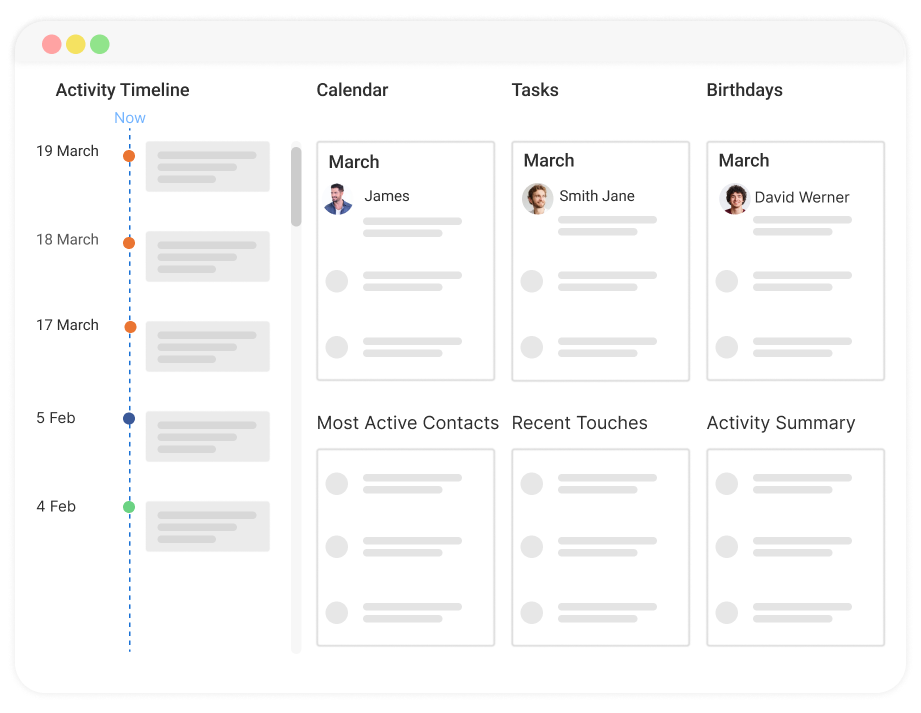
- Build Better Relationships: With a 360° view of every customer interaction, you can personalize communication and boost loyalty.
- Boost Sales & Marketing: Track deals, automate follow-ups, and nurture leads with ease. A CRM helps you close more by making sure no opportunity is missed.
- Make Smarter Decisions: With built-in analytics, you can spot sales trends, identify bottlenecks, and improve performance.
- Collaborate as a Team: Everyone sees the same up-to-date customer info, so your team works in sync and delivers a better experience.
CRM isn’t one-size-fits-all — different industries benefit in unique ways. For instance, if you run a medical practice or clinic, check out our guide on What Is Healthcare CRM? to see how it can streamline patient management and improve care outcomes. In short, a CRM keeps your business on track—helping you save time, grow revenue, and serve your customers better.
My Top 3 Picks for the Best Small Business CRM
If you’re short on time, here’s a quick look at my top three picks:
- BIGContacts:
An easy-to-use & affordable CRM that enhances contact management, email marketing, workflow automation, and pipeline tracking.
- Agile CRM:
Ideal for small businesses needing a CRM tool that integrates sales, marketing, and customer service in one platform. However, some users have noted that its reporting features can be a bit limited compared to other CRM solutions.
- Nimble:
Perfect for small businesses seeking a social CRM that combines contact management with social media insights. Keep in mind, its social media features can be overwhelming for businesses with larger social media presence or those seeking more advanced analytics.
Top 13 Best CRMs for Small Businesses
To compile this list, I evaluated each tool based on its ease of use and scalability, ensuring they cater to various small business CRM needs. My assessment is based on personal experiences, insights from trusted reviews, and feedback from industry peers.
| CRM Software | Best for | Pricing |
|---|---|---|
| BIGContacts | Contact Management & Email Marketing for Small & Medium Businesses | Forever free for small teams. Paid plan starts at $9.99/month. |
| Monday CRM | Visual Task Tracking | Starts at $12/user/month. |
| Zendesk Sell | Lead & Deal Management | Starts at $19/user/month. |
| HubSpot | Centralizing Sales, Marketing, & Support Operations | Starts at $9/user/month. |
| Agile CRM | Integrated Sales, Marketing & Support | Starts at $48.9/user/month. |
| Pipedrive | Sales-focused teams | Starts at $14/user/month. |
| Salesforce | Complex Sales Organizations | Starts at $25/user/month. |
| Zoho CRM | Omnichannel Engagement | Starts at $9.2/user/month. |
| Salesmate | Sales Pipeline Management | Starts at $23/user/month. |
| Freshsales | Lead Scoring | Starts at $8.7/user/month. |
| Keap | Marketing Automation | Starts at $249/month. |
| Less Annoying CRM | Simple, budget-friendly CRM for very small teams | Starts at $15/user/month. |
| Capsule CRM | User-friendly CRM with customization | Starts at $18/user/month. |
1. BIGContacts – Best for Contact Management & Email Marketing for Startups & Small Businesses
BIGContacts (by ProProfs) is one of the best small business CRM solutions for teams that want a blend of contact management and integrated email marketing. In my experience, the contact management is robust: you get 360-degree contact profiles where every email, note, task, file, and interaction is logged in one place. This gives me an all-in-one view of each customer, similar to what higher-end CRMs promise.
Also, the built-in sales pipeline management is visual and simple – you can track deals through stages and see your whole funnel at a glance. I also like the segmenting of contacts into static or dynamic lists (think of dynamic lists as saved filters that update automatically), which makes targeted email campaigns easier.
Collaboration is pretty seamless, too. The calendar and task management features let my team coordinate follow-ups and meetings in one place. Plus, BIGContacts offers 24/7 human support via phone, chat, and knowledge base. Whenever I have a question, support is quick to respond and very helpful (I didn’t expect that level of support on a lower-priced product).
What You’ll Like:
- Segmentation of contacts into static and dynamic lists for more targeted communication
- 360-degree contact profiles with emails, notes, tasks, files, transactions, etc., all in one place
- Automated drip email campaigns that adapt to the contact’s stage in the sales cycle
- Calendar management features for tracking appointments and better team collaboration
- Awesome human support 24/7 via phone, chat, and knowledge base
- The interface is user-friendly and helps in navigating easily
Pricing:
Forever free for small teams. Paid starts at $9.99/month.
Here’s what Ewald Kubota, a renowned name in the agricultural and construction equipment industry, has to say about BIGContacts:
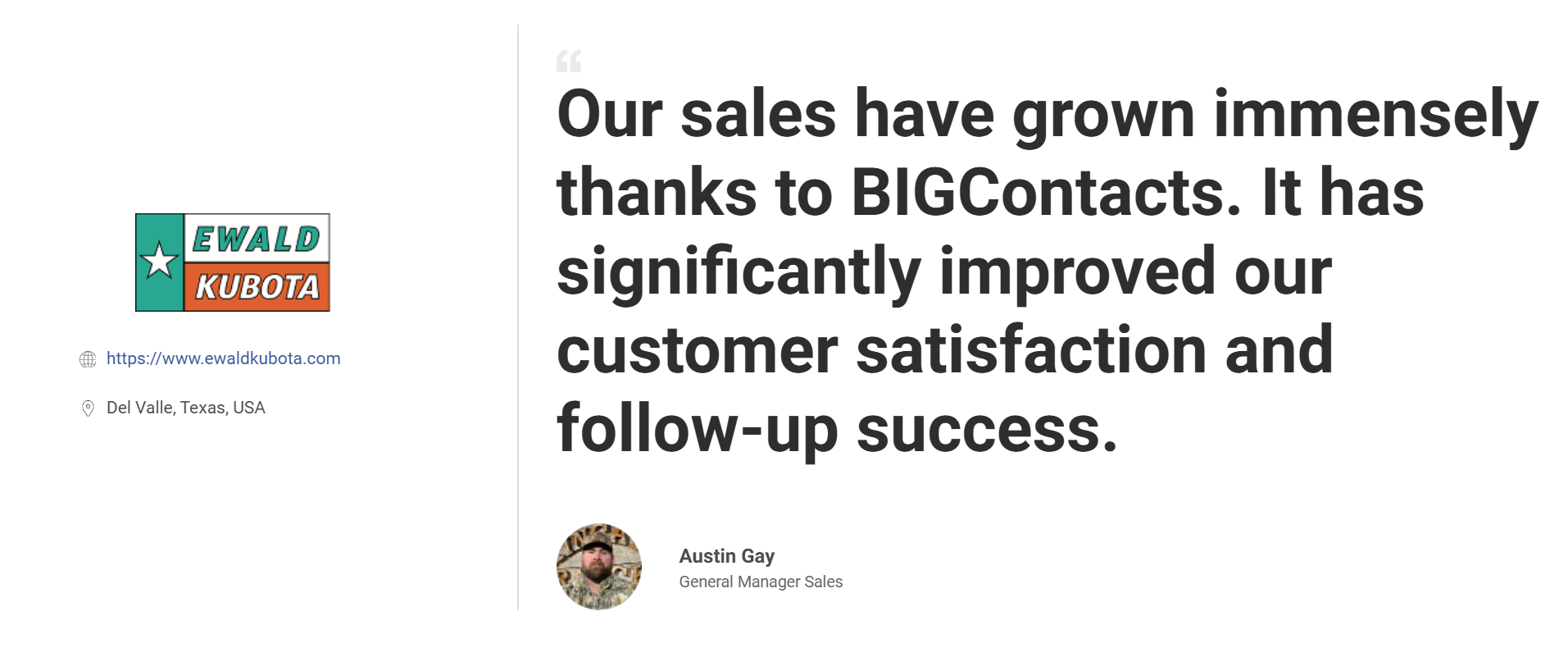
2. Monday CRM – Best for Visual Task Tracking
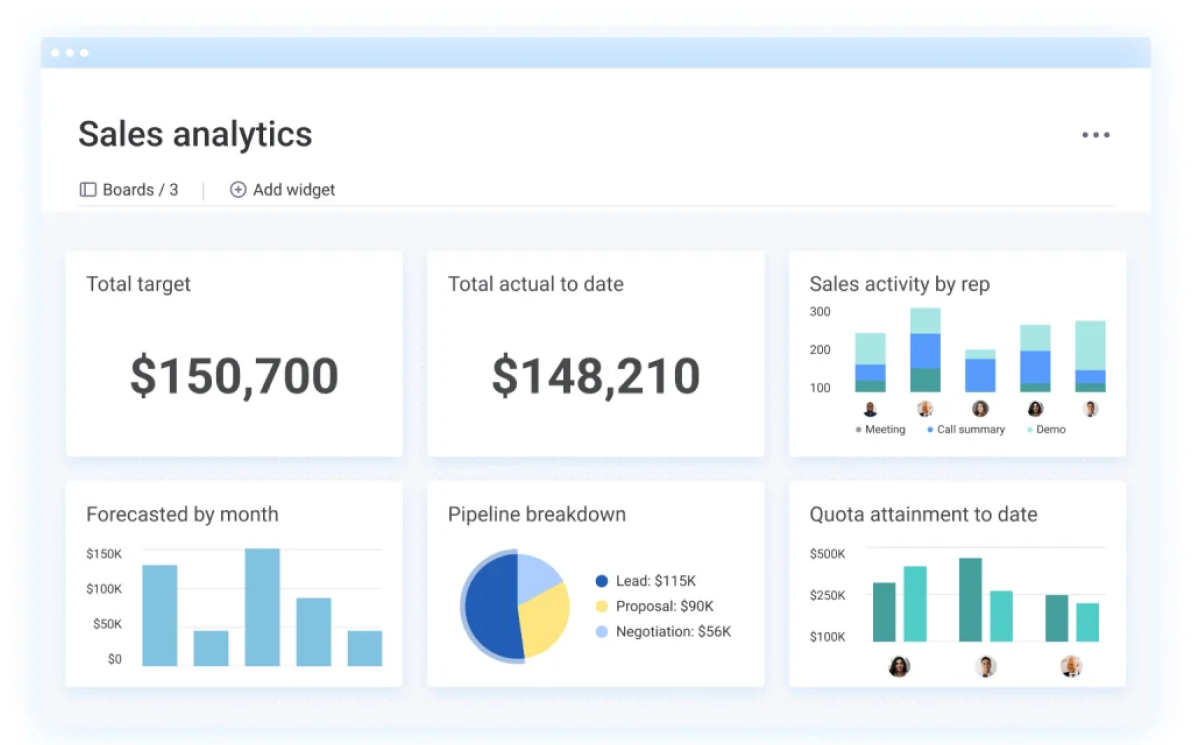
Image Source: Monday CRM
I found Monday CRM incredibly helpful for managing customer relationships and tasks in one place. If you’re a visual thinker, its customizable boards make tracking deals and workflows easy—you can literally drag and drop leads through each stage of your pipeline.
Built on Monday.com’s work platform, it combines CRM and project management, which was perfect for handling sales follow-ups, delivery steps, and internal tasks. I especially liked the automated task lists (e.g., send intro email on Day 1, follow-up call on Day 3) and how deal updates could trigger actions like moving a won deal to a new onboarding board.
It also offers solid contact management, deal tracking, basic automation, and seamless integration with tools like Gmail, Outlook, and Google Calendar. With built-in templates and a modern, team-friendly interface, Monday CRM is flexible enough to manage sales, projects, and internal workflows—all in one.
What You’ll Like:
- Customizable boards for visual task management allow you to easily track progress and stay organized
- Lead management to easily capture, assign, and track leads from initial contact to conversion, improving your sales process
- Centralized communication to keep all customer communication in one place, including emails, calls, and notes, for easy access and tracking
- Time tracking to track the time spent on tasks and projects, helping you monitor productivity and improve team efficiency
Pricing:
Starts at $12/user/month.
3. Zendesk Sell – Best for Lead & Deal Management
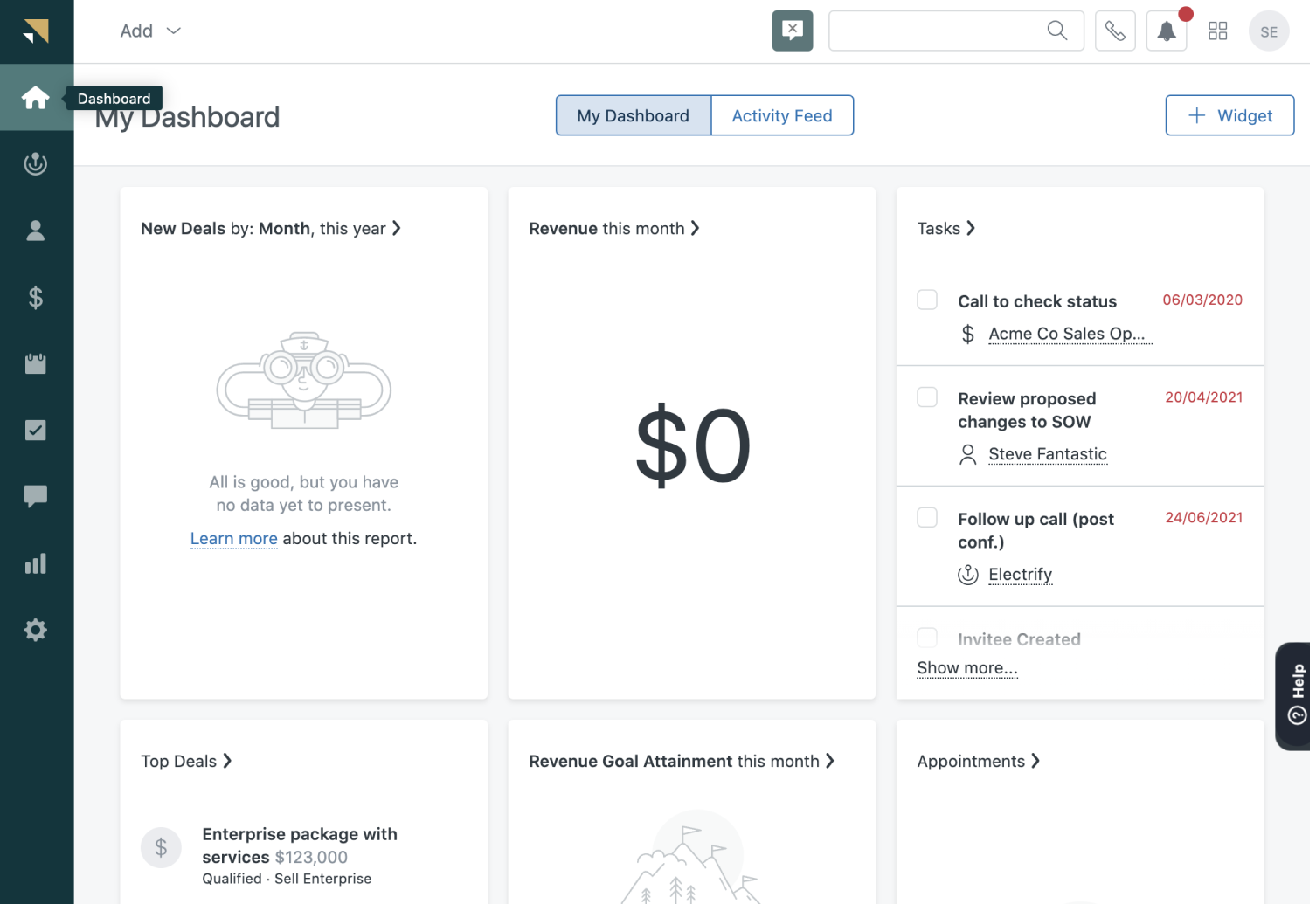
Image source: Zendesk Sell
Zendesk Sell is one of the most intuitive sales CRMs I’ve used for managing leads and deals. Its clean interface, built-in dialer, and mobile app made it easy to track interactions, update deals, and stay productive on the go.
I especially liked how quickly I could import contacts and start working with a streamlined pipeline. The real-time reporting and simple UI helped me focus on closing deals, not configuring settings. It integrates well with tools like Mailchimp, Google Drive, and Zendesk Support, but it’s strictly sales-focused—so if you need built-in marketing or support features, you’ll need to connect additional tools.
For small businesses that want a fast, focused CRM for managing deals, Zendesk Sell gets the job done with minimal setup. It’s perfect if your team is sales-driven and wants something simple, fast, and mobile-friendly.
What You’ll Like:
- Integration with apps like Mailchimp, PandaDoc, Google Drive, Microsoft 365, and more of easy workflow automation
- Drag-and-drop custom analytics dashboards to create personalized reports and make data-driven decisions
- An integrated dialer for seamless calling to track phone communications directly within the CRM
- Quick onboarding process and easy data import allow for a smooth transition and minimal downtime
Pricing:
Starts at $19/user/month.
4. HubSpot – Best for Centralizing Sales, Marketing, & Support Operations

Image Source: HubSpot
HubSpot CRM quickly became my go-to tool for managing all aspects of my business. It brought together sales, marketing, and customer service in one easy-to-use platform. I could easily track leads, automate follow-ups, and run email marketing campaigns without needing separate tools for each function.
The shared inbox and team collaboration features helped keep everything in sync across departments. As a CRM for small businesses, HubSpot gave me a clear view of customer interactions and insights, enabling me to make more informed decisions.
The platform’s automation features saved me time on routine tasks, while its reporting tools gave me in-depth visibility into sales performance and marketing efforts. HubSpot CRM allowed me to streamline and simplify my business operations, making it an essential tool for growth and efficiency.
What You’ll Like:
- Drag-and-drop email builder to create engaging, professional campaigns without coding
- Built-in SEO and content tools to help optimize marketing efforts, driving more organic traffic
- AI-powered chatbots to handle customer queries instantly, reducing response time and improving engagement
- Automated lead scoring to help prioritize high-intent prospects, improving conversion rates
Pricing:
Starts at $9/user/month.
5. Agile CRM – Best for Integrated Sales, Marketing & Support
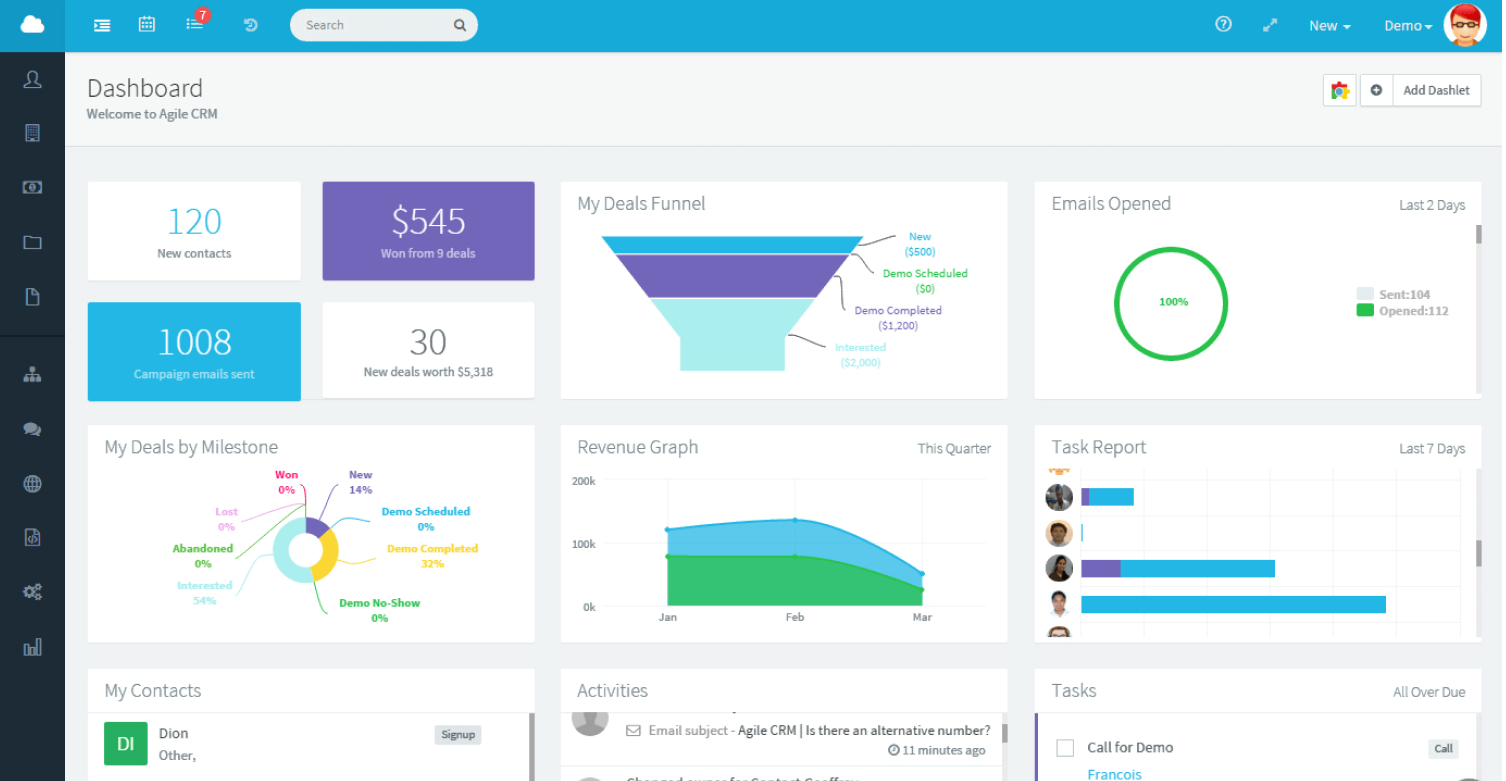
Image Source: Agile CRM
Agile CRM is a solid all-in-one platform that combines sales, marketing, and support features in a single dashboard—perfect if you want to manage everything without juggling multiple tools. I especially liked the visual marketing automation builder, which let me create email sequences with simple drag-and-drop logic.
The built-in phone dialer and email tracking made sales follow-ups easy, and the kanban-style deal pipeline kept things organized. While the support module is basic, it’s useful for small teams handling tickets and FAQs.
Agile’s real strength is in unifying data—like linking email campaigns to sales outcomes or comparing support trends with revenue. The interface can feel cluttered at times due to the wide range of features, but once you get used to the layout, it’s a powerful, budget-friendly tool for growing teams.
What You’ll Like:
- Project management with tasks, milestones, and collaboration tools
- Contact management with lead scoring, segmentation, and nurturing
- Gamification to increase collaboration, lead conversion, and revenue generation
- Marketing automation with web engagement, email campaigns, and social marketing
Pricing:
Starts at $48.9/user/month.
6. Pipedrive – Best for Sales-Focused Teams
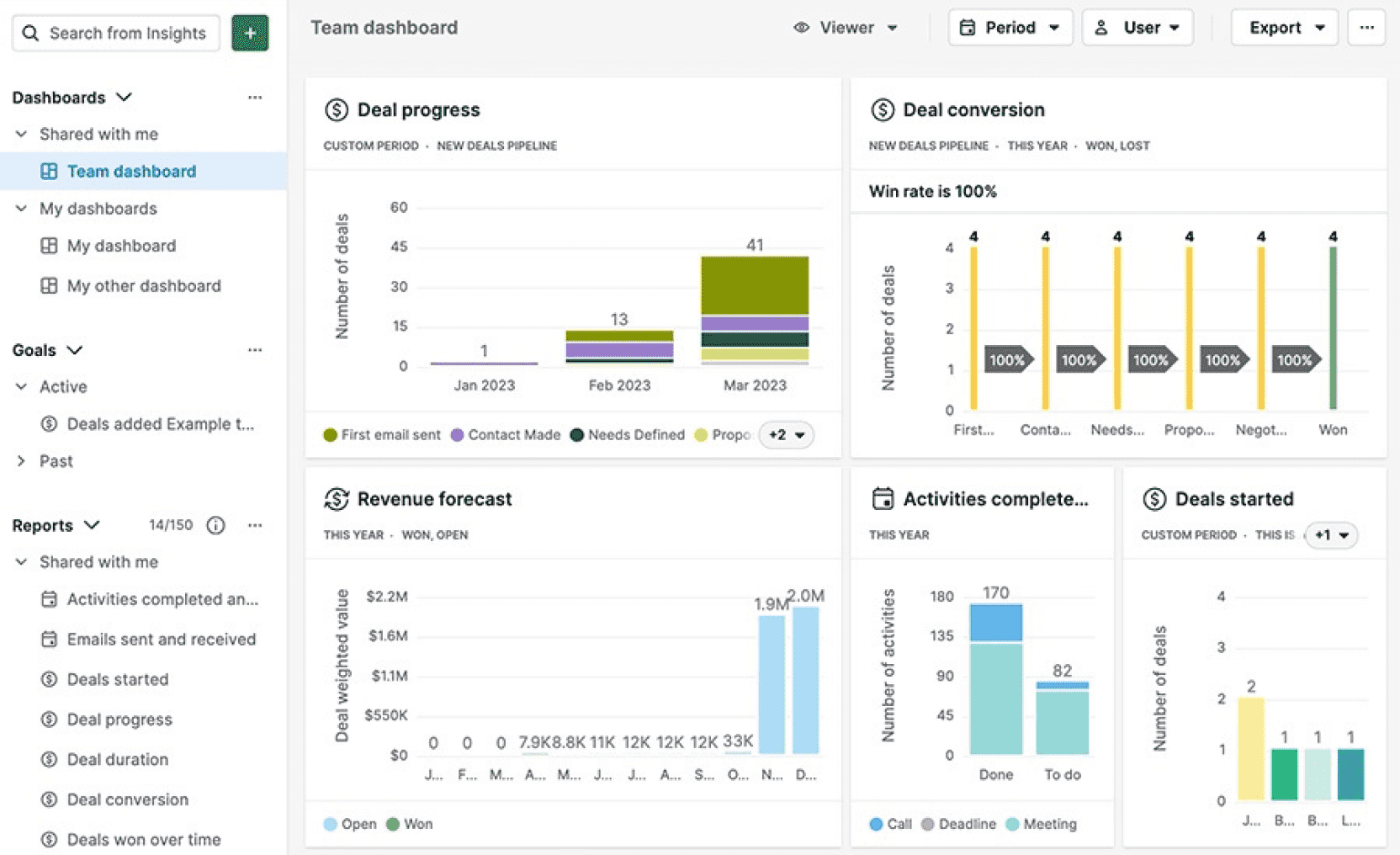
Image Source: Pipedrive
Pipedrive CRM was exactly what my sales team needed to stay organized and boost productivity. It helped us manage our leads and sales pipeline visually, so we always knew the status of each deal. The customization options allowed us to tailor the pipeline stages to match our unique sales process, which made everything run more smoothly.
As one of the best small business CRM software options, Pipedrive offers easy-to-use tools for automating follow-ups, tracking customer interactions, and generating actionable insights from real-time data.
The integration with other tools, like email and calendar, kept everything centralized and streamlined. We were able to focus on what mattered—closing deals—while Pipedrive took care of the repetitive tasks. Its flexibility made it easy for our small team to scale, and the reporting tools gave us a clear view of our sales performance.
What You’ll Like:
- Customizable pipelines that fit your unique sales process help you stay organized and prioritize deals effectively
- A visual sales funnel with drag-and-drop functionality, making it easy to move deals through each stage and track progress effortlessly
- AI-powered sales insights and tips to help you optimize your strategy and increase conversion rates
- Automated reminders and follow-ups that ensure you stay on top of every opportunity, helping you close deals on time
Pricing:
Starts at $14/user/month.
7. Salesforce – Best for Complex Sales Organizations
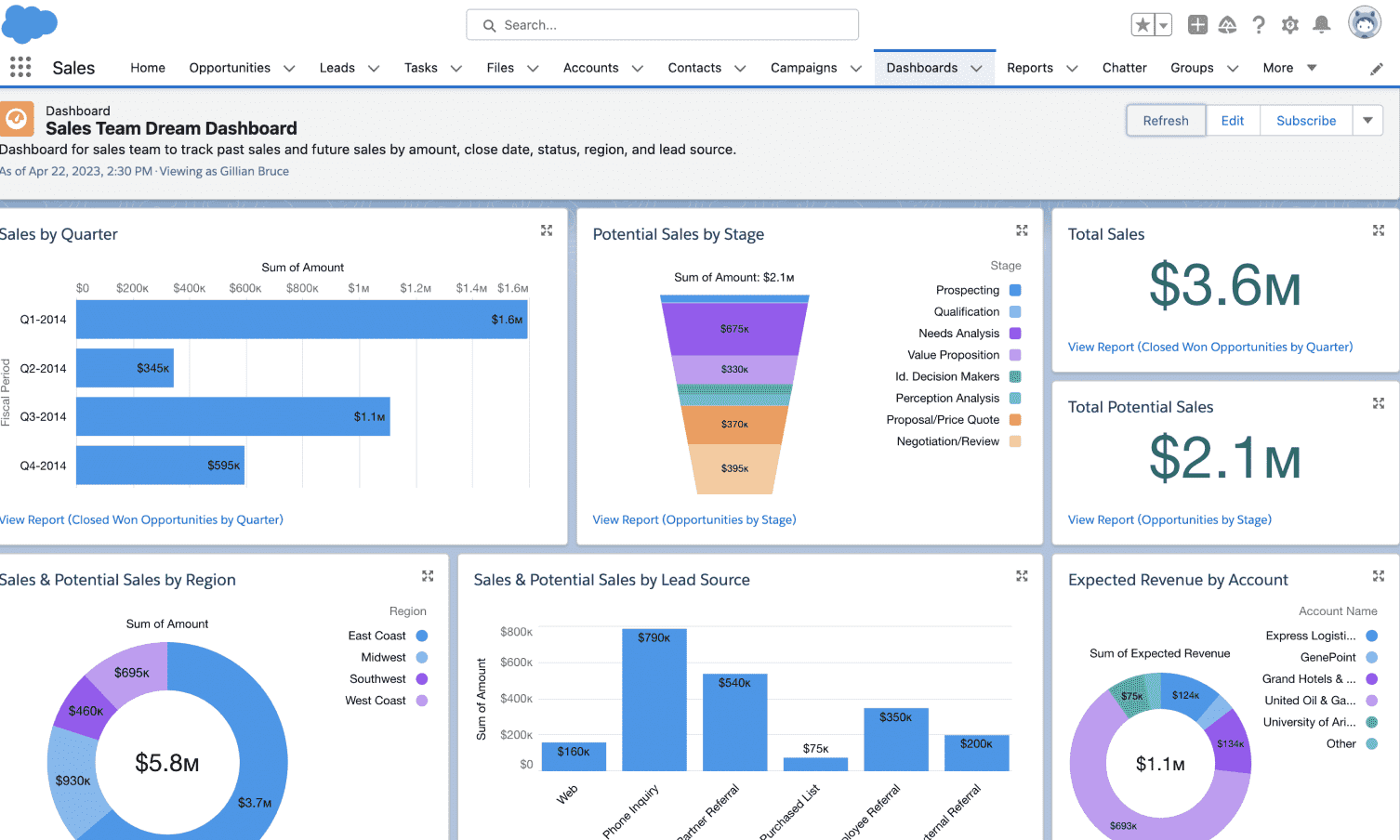
Image Source: Salesforce
Salesforce is a powerhouse CRM known for its deep customizability and scalability. I used it when our sales process grew more complex, and while it felt like driving a high-performance race car, it required some setup and training.
Even the small business version (Essentials) offered advanced features like lead scoring, workflow automation, and AI-driven insights with Salesforce Einstein. I loved how easily it integrated with tools like our phone system and accounting software, and the AppExchange gave us access to countless third-party add-ons.
Collaboration between sales and support was seamless thanks to shared data across Sales Cloud and Service Cloud. However, the platform can feel overwhelming for smaller teams, and we had to hire a consultant to configure it properly.
What You’ll Like:
- Lead scoring to automatically prioritize high-potential leads, ensuring you focus on the most promising opportunities
- Customizable workflow automation to streamline repetitive tasks with tailored automation, saving time and reducing errors
- AI-powered insights to get actionable insights and predictions on sales trends, helping you make data-driven decisions
- Multi-channel communication to engage with customers through email, phone, social media, and more, ensuring a seamless experience across channels
Pricing:
Starts at $25/user/month.
8. Zoho CRM – Best for Omnichannel Engagement
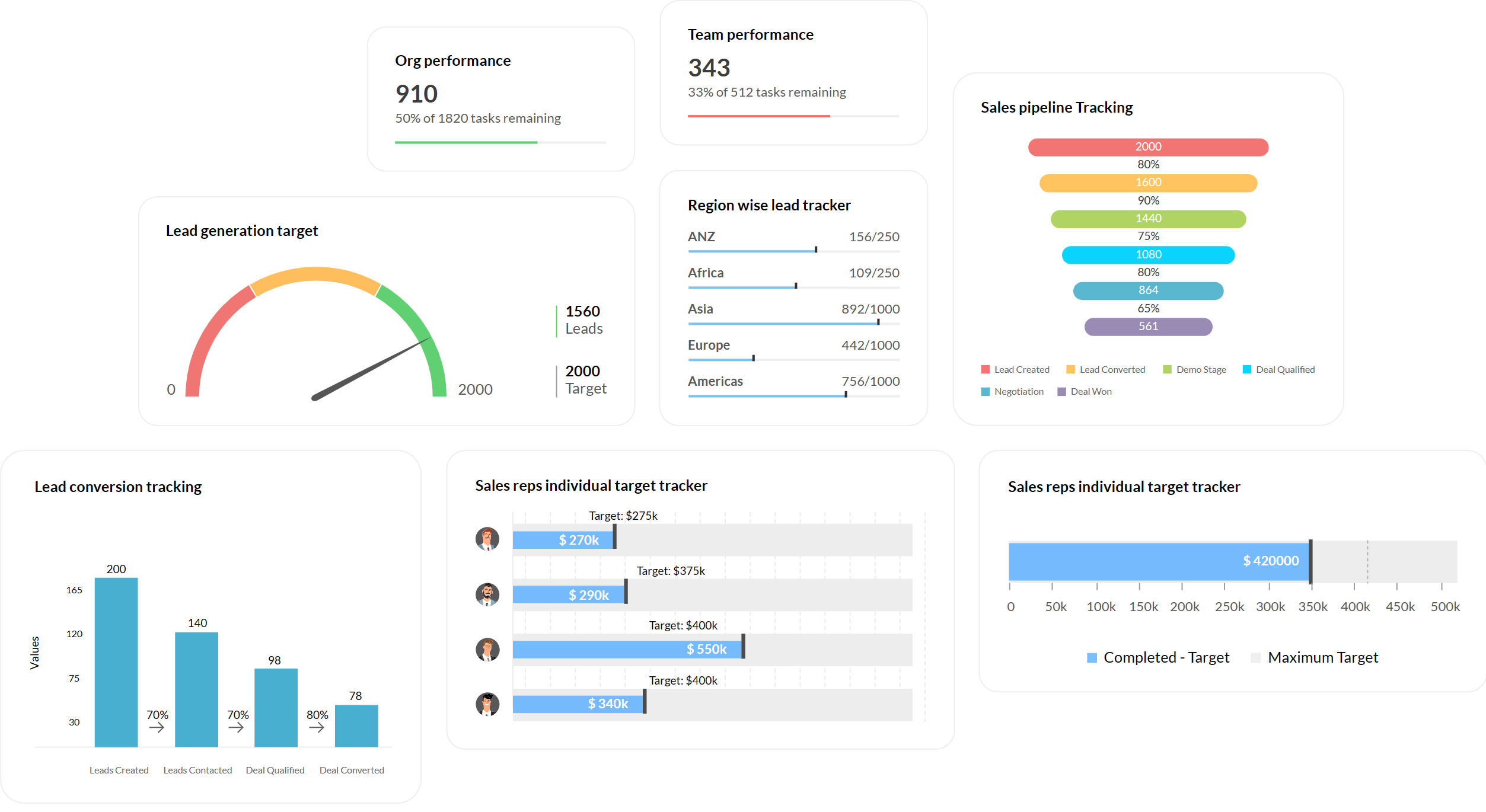
Image Source: Zoho
Zoho CRM is a feature-rich, affordable option ideal for small and midsize businesses. I found it especially useful for managing customer interactions across email, social media, live chat, and phone—all in one place.
Its tight integration with other Zoho tools like Campaigns, Desk, and SalesIQ gave me a complete view of customer activity. I loved how customizable it was—adding custom fields, modules, and process flows without coding.
Features like Blueprints helped enforce our sales process, and workflow automation saved time on follow-ups and task assignments. While the interface is simple, Zoho’s functionality and native integrations make it a strong all-in-one CRM that grows with your business.
What You’ll Like:
- Omnichannel communication integration for seamless customer engagement
- Customizable fields to create fields that fit your business processes, making it easier to manage data in a way that suits your needs
- Reports & analytics to track performance, providing actionable insights to improve your sales strategies
- Customizable dashboards to track important metrics and performance
Pricing:
Starts at $9.2/user/month.
9. Salesmate – Best for Sales Pipeline Management
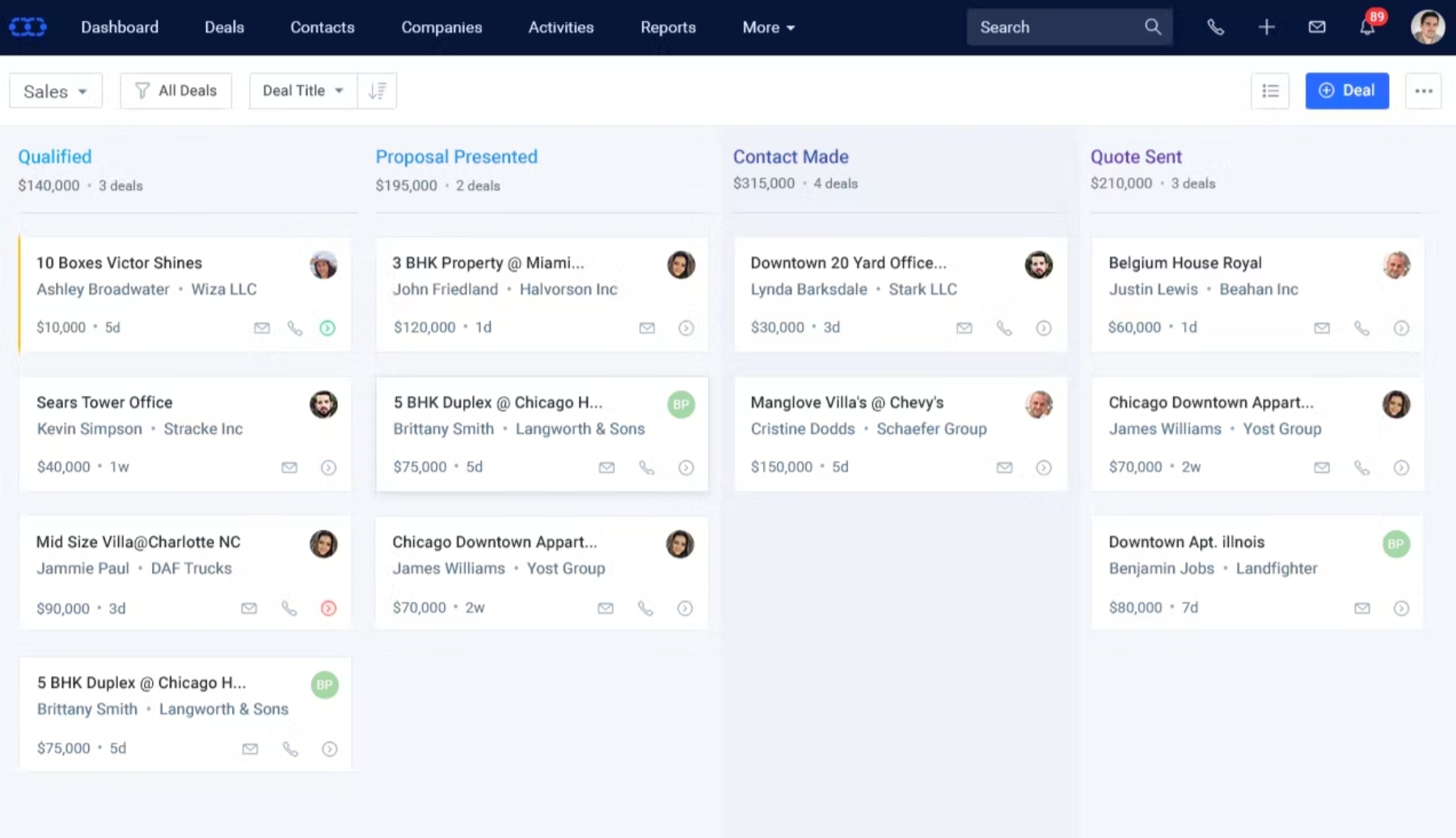
Image Source: Software Advice
Salesmate offers a clean interface with a visual kanban-style pipeline that made it easy for me to manage deals and customize stages to fit our sales process. I loved the built-in calling and texting. Our team used a virtual number to handle calls and SMS directly from the CRM, with all interactions logged under the contact’s timeline.
This multi-channel communication was a big plus, especially for clients who preferred texting. The automation features were solid, too. We set up drip sequences for cold outreach that combined emails, texts, and call reminders.
Salesmate also integrates well with Gmail, Calendly, and Zapier, and its web forms let us capture and respond to leads instantly. While the reporting tools are fairly standard, they were more than enough for our small team to track performance and stay organized.
What You’ll Like:
- Contact Segmentation to organize contacts into segments for targeted marketing and personalized communication
- Activity Tracking to monitor calls, emails, meetings, and tasks in one place, ensuring no follow-up is missed
- Customizable dashboards to track the most important metrics, making it easy to focus on what matters
- Visual sales pipeline to track deals and prioritize leads
10. Freshsales – Best for Lead Scoring
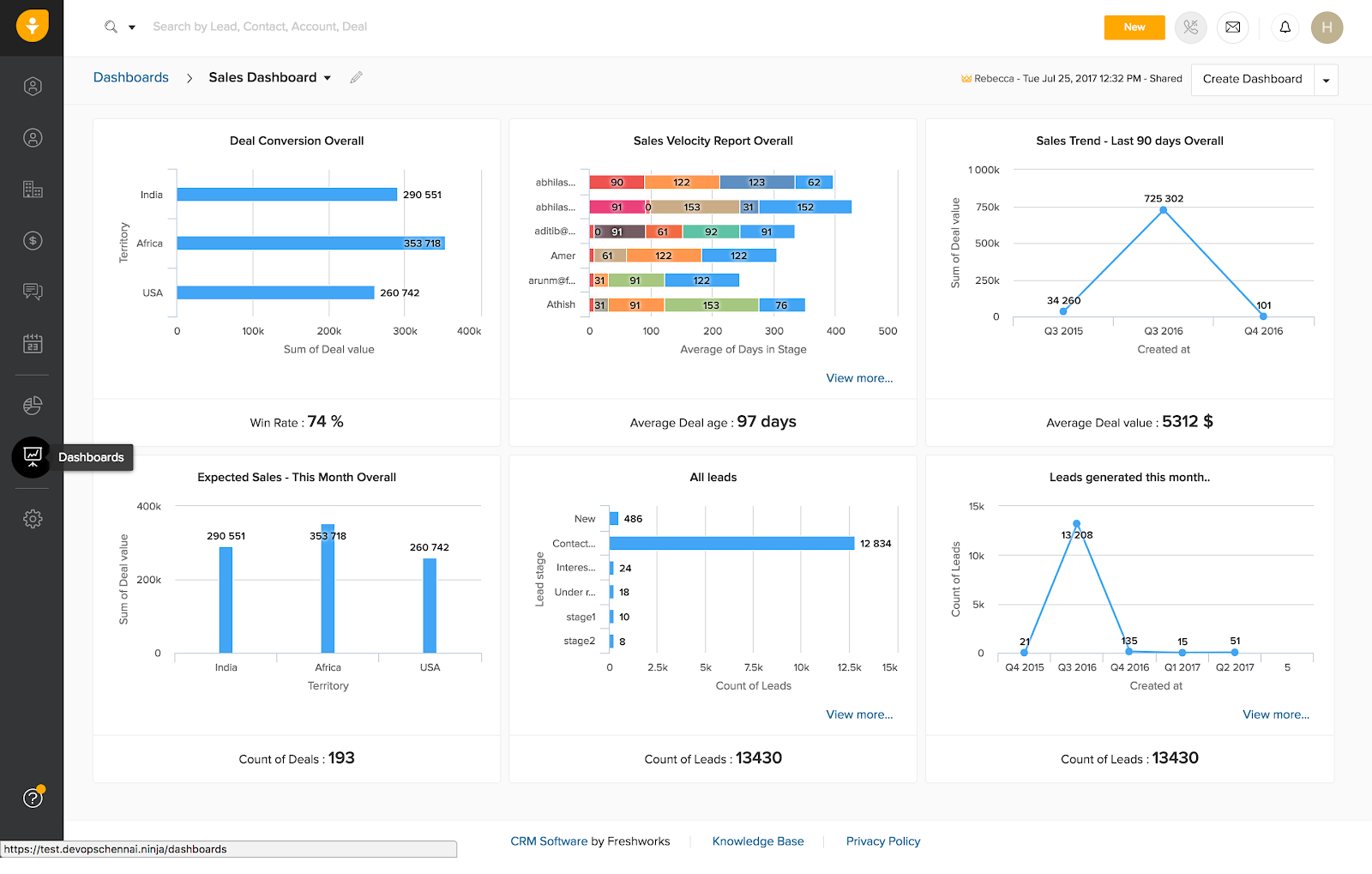
Image Source: Freshsales
Freshsales stood out to me for its smart use of AI and automation to help prioritize leads. It’s Freddy AI lead scoring automatically ranks prospects based on behaviors like email opens or site visits, and I could also add custom rules to fine-tune scores. This helped our team focus on high-potential leads first.
The interface is modern and clean, and I liked the visual pipelines and customizable deal stages. Freshsales also offered built-in phone, email, WhatsApp, and chat, so all communication was logged in one place.
The workflow automation was powerful, letting us trigger tasks or emails based on lead behavior, which kept follow-ups consistent. While the reporting isn’t as deep as enterprise tools, it gave us strong insights into lead sources, deal progress, and campaign ROI—perfect for a small, growth-focused team.
What You’ll Like:
- Lead scoring to identify and prioritize high-potential leads, ensuring you focus on the most promising prospects
- Customizable pipelines to align with your unique sales process, helping you stay organized and track deals more effectively
- Integrated communication channels (email, phone, chat) to streamline customer interactions and provide multi-channel support
- Automation of repetitive tasks like follow-ups and reminders, saving you time and ensuring no lead is forgotten
Pricing:
Starts at $8.7/user/month.
11. Keap – Best for Marketing Automation
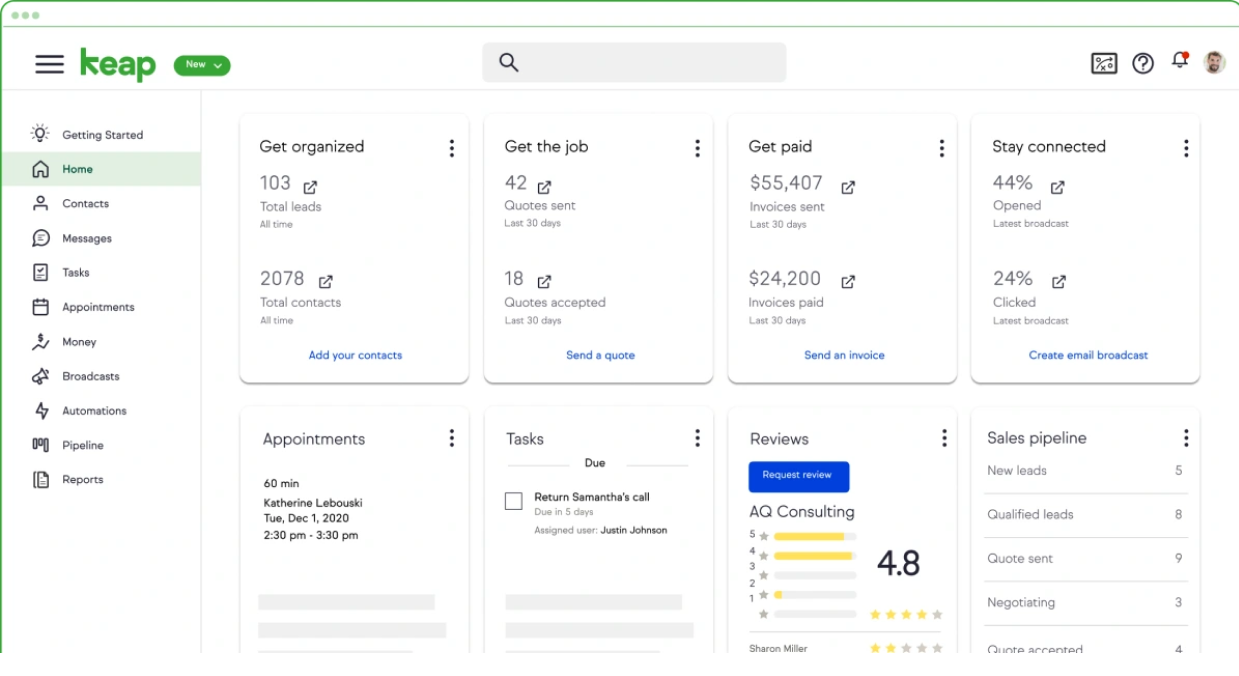
Image Source: Keap
I used Keap for marketing automation, and it helped me streamline several processes. For example, I was able to automate follow-up emails, create custom landing pages, and manage leads more effectively.
It enabled me to manage customer data, send personalized emails, and automate routine tasks—all in one platform. Keap’s workflow automation saved me time and allowed me to focus on growing the business.
I also loved the way it integrated with various tools, helping me manage everything from lead capture to client conversion. Whether you’re running email campaigns or need tools for customer segmentation, Keap has a simple yet powerful way to automate marketing, making it ideal for small businesses.
What You’ll Like:
- Lead scoring system to prioritize high-quality prospects, making sales outreach more effective
- Built-in invoicing and payment integration to streamline transactions, reducing manual work
- Pre-built marketing automation templates to save time and help launch campaigns faster
- Automated follow-up sequences to ensure no lead is forgotten, improving conversion rates
Pricing:
Starts at $249/month.
12. Less Annoying CRM – Best for Simplicity & Solo Entrepreneurs
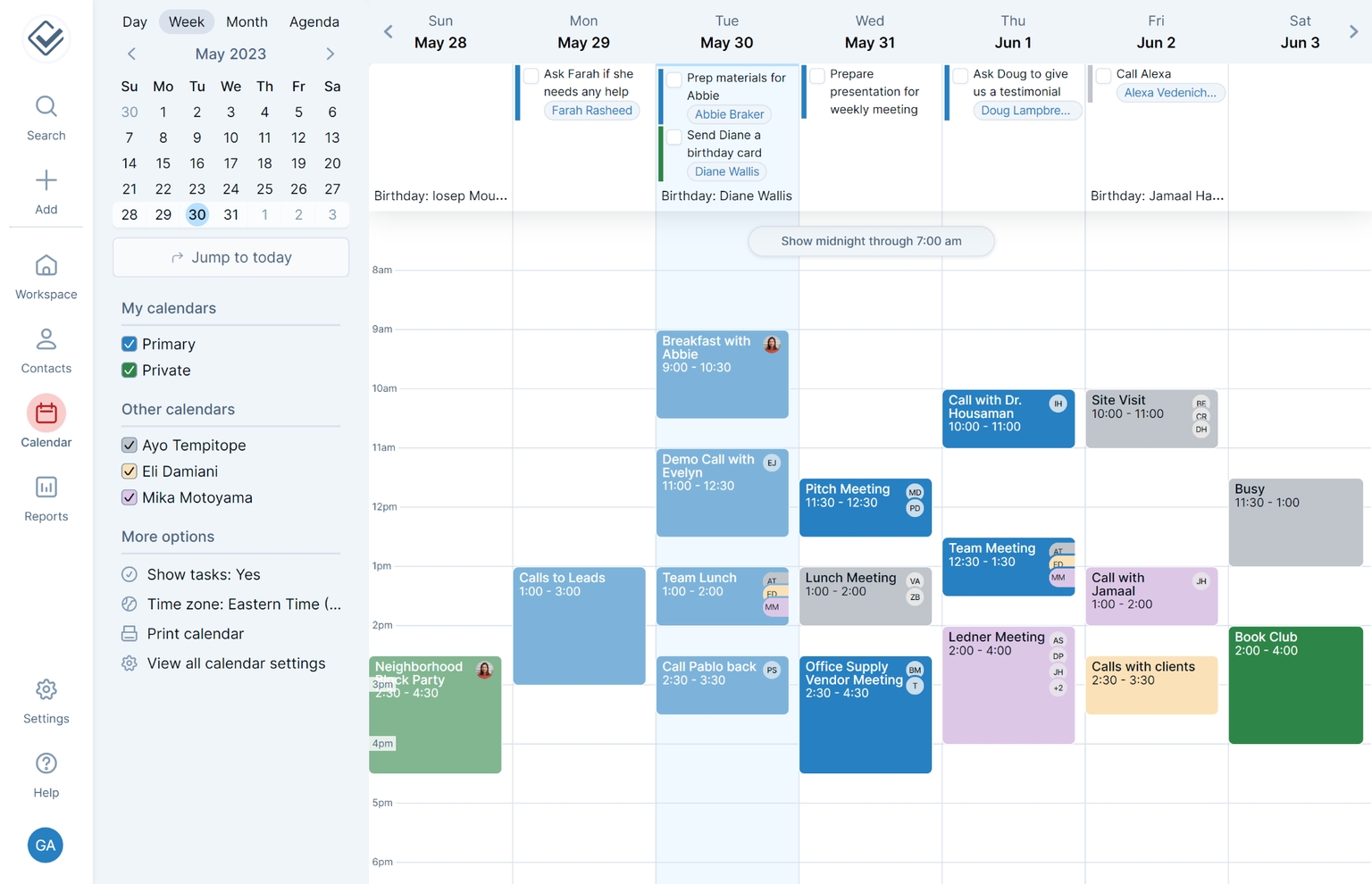
Image Source: SoftwareWorld
Less Annoying CRM lives up to its name—it’s easily one of the simplest, cleanest CRMs I’ve ever used. I tried it during a phase when I didn’t want to deal with complicated setups, and it was refreshingly straightforward. It’s built for solo entrepreneurs and small teams who need the basics done well: contact management, pipelines, tasks, and follow-ups—all without extra fluff.
I was able to import my contacts, set up my pipeline, and start using it fully within an hour, no training required. What I appreciated most was the built-in calendar and task reminders—it helped me stay on top of follow-ups without needing to jump between apps.
Less Annoying CRM doesn’t try to be a sales and marketing suite, and that’s the point. If you just need a reliable, no-frills CRM that’s easy to maintain and doesn’t overwhelm you with features you’ll never use, this one’s a great fit.
What You’ll Like:
- Centralized contact profiles with custom fields, notes, and interaction history to easily track every lead and customer
- Visual, customizable pipeline to monitor sales progress without unnecessary complexity
- Built-in to-do list and calendar system to assign tasks to contacts, set reminders, and view your schedule in one place
- Role-based permissions to manage team access and collaboration
Pricing:
Starts at $15/user/month.
13. Capsule CRM – Best for User-Friendly CRM With Customization
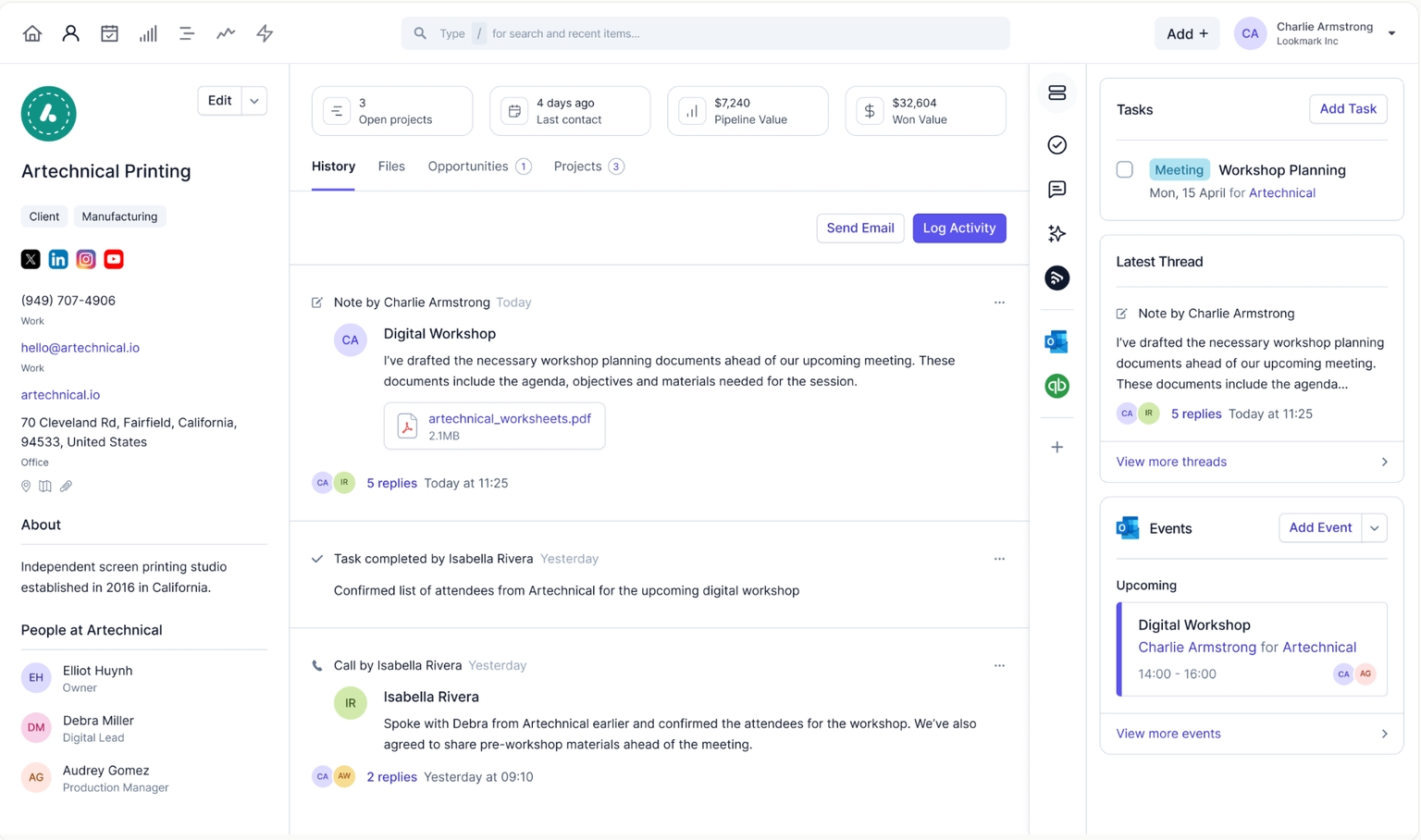
Image Source: Capsule CRM
I used Capsule CRM when I needed a system that was easy to learn but flexible enough to grow with my sales process. It didn’t overload me with features I didn’t need, but still gave me the flexibility to customize pipelines, contact fields, and tags to fit my business.
Capsule made it easy to track sales opportunities with a visual pipeline, set up contact timelines, and log tasks or notes right on each contact’s profile. I also liked how tagging worked—you can tag contacts based on industry, lead status, or any behavior, and use that to segment and personalize outreach.
I integrated Capsule with Gmail, Xero (for invoicing), and Mailchimp in a matter of minutes—so everything from sales to email marketing was synced. If you’re a small business looking for a lightweight CRM that you can truly make your own, Capsule hits that sweet spot between simplicity and flexibility.
What You’ll Like:
- Simple yet powerful sales pipeline to track deals visually and move them through custom sales stages with drag-and-drop ease
- Task and calendar tools to stay organized with to-dos, appointment scheduling, and calendar syncing with Google or Outlook
- Custom fields & tags to personalize contact records with fields that match your workflow
- Access Capsule on the go via its mobile app with full contact and sales pipeline functionality
Pricing:
Starts at $18/user/month.
Key Features of a Small Business CRM
With so many options out there, it’s important to know what features to look for in the best small business CRM. Here are some key features that can really help you out:
1. Contact Management
A CRM’s contact management feature helps you to keep all your customer details in one centralized location. You can store key information like names, contact info, purchase history, and even specific preferences or communication notes. This feature helps you quickly access relevant details during customer interactions, making it easier to personalize your conversations and improve the customer experience.
If customization is a high priority for your business, check out this list of top customizable CRM software that let you tailor pipelines, fields, and workflows to match your exact process.
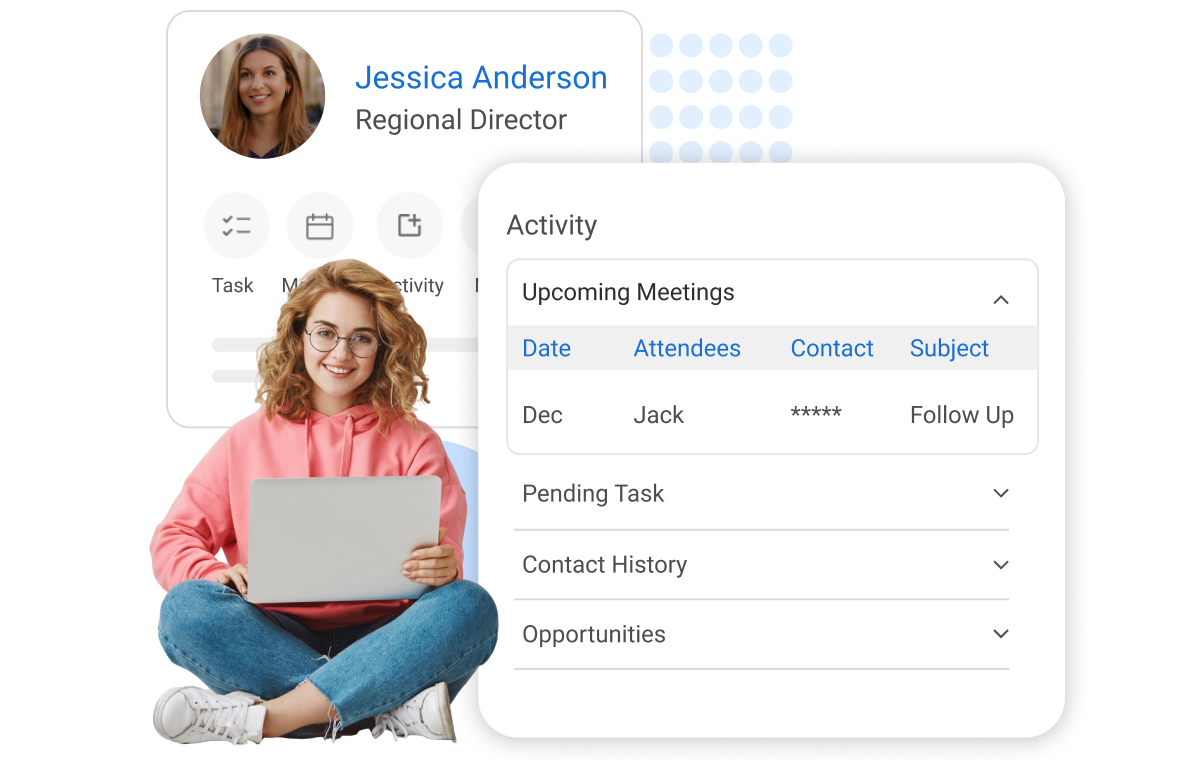
2. Sales Pipeline Tracking
Sales pipeline tracking helps you visualize the entire sales process, from lead generation to closing the deal. A CRM allows you to track where each lead is in the sales journey, such as whether they’re just starting to show interest, are in the negotiation phase, or are ready to purchase. This visibility lets you prioritize efforts, send timely follow-up emails, and manage your resources effectively. It ensures you stay organized and don’t miss any opportunities to close sales.
To learn more about effectively building and managing your sales pipeline, check out this helpful video:
3. Task Automation
Task automation is one of the most valuable features of a CRM. With it, you can set up automated reminders for follow-up calls, emails, or meetings, ensuring you never forget a critical task. CRMs can also automatically send personalized messages based on triggers like a customer’s purchase date or a follow-up reminder. This saves you time and reduces the risk of human error.
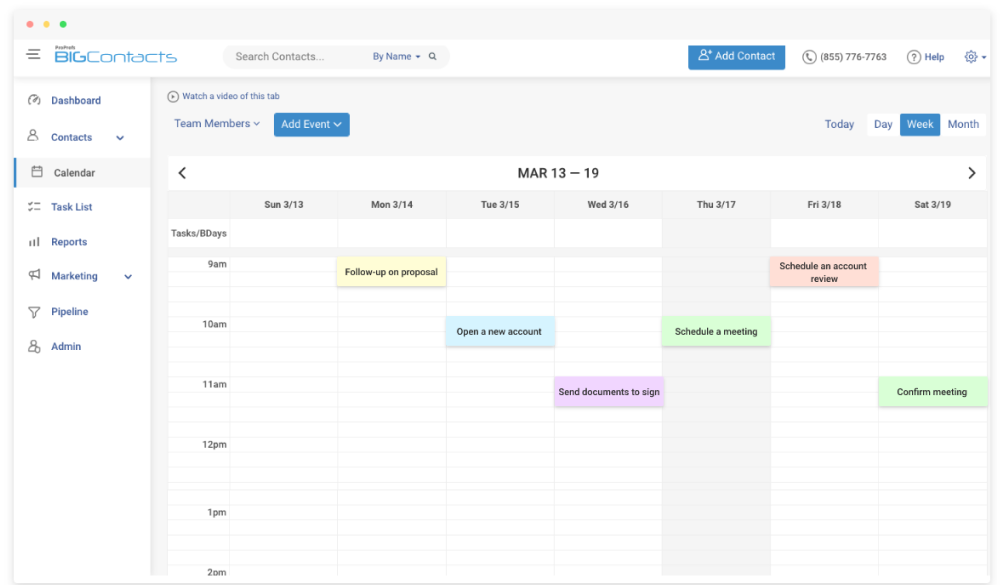
4. Customer Support Tools
A CRM equipped with customer support tools is invaluable for managing service inquiries and resolving issues efficiently. Features like ticketing systems help your team to track customer problems, prioritize based on urgency, and ensure quick responses. This helps you provide consistent support and improve customer satisfaction.
5. Reporting & Analytics
A CRM’s reporting and analytics capabilities provide deep insights into your customer behavior and business performance. It helps you analyze key metrics like sales trends, customer retention rates, and campaign effectiveness. By generating customizable reports, you can identify patterns that allow you to refine your marketing strategies, sales tactics, and customer engagement efforts.
Some modern CRMs now use AI to predict sales trends, score leads, and automate insights. Learn more in this guide on AI-powered CRM tools for small businesses.
6 Steps to Help You Choose the Best CRM for Your Small Business
Choosing the right CRM for your small business can feel like a big task, but breaking it down into clear steps can help make the process easier. Here are six steps to guide you:
1. Identify Your Needs
Before you dive into CRM options, take a moment to figure out what your business truly needs. Do you want to manage customer relationships, track sales, or automate marketing? Knowing the key functions that will benefit your business will help narrow down your options.
2. Keep It Simple
As a small business, you don’t need a complex, feature-packed CRM right away. Look for a CRM that is easy to use, with a clean interface and basic functionalities like contact management, lead tracking, and communication history. Avoid over-complicating things.
3. Consider Your Budget
CRMs can vary significantly in price. Take a look at your budget and consider both short-term and long-term costs. Many CRM providers offer free trials, so take advantage of these to test the tools before committing to a subscription plan.
4. Look for Integration Options
Your CRM should integrate smoothly with the other tools you’re already using, such as email marketing software, accounting programs, and social media platforms. Check whether the CRM can connect to your existing systems without needing extra work or complex setups.
5. Check for Scalability
Even though your business might be small now, it’s important to choose a CRM that can grow with you. Look for features that will allow you to scale—like advanced analytics, automation tools, and custom fields—without having to switch to a new system as your business expands.
6. Evaluate Customer Support
Good customer support can make all the difference when you’re learning a new tool. Look for a CRM provider that offers helpful support, whether it’s through live chat, email, or a knowledge base. This will save you time and frustration down the line.
Once you’ve chosen the right CRM, the next step is setting it up correctly. Follow this CRM implementation plan for small businesses to avoid common mistakes and launch successfully.
Smart Choice, Big Impact: Pick the Best CRM Today!
Choosing the right CRM for your small business is crucial for managing customer relationships effectively. Start by identifying your business needs and goals. Do you need a tool for managing sales, customer support, or marketing? Next, consider ease of use. A CRM should be intuitive and require minimal training so your team can get up and running quickly.
Affordability is another key factor. Look for CRM solutions that offer flexible pricing plans, including free trials or entry-level plans that fit your budget. Some CRMs, like BIGContacts, even offer a forever-free plan, making it easier for small businesses to get started without any upfront cost.
Lastly, customer support and resources are vital. Choose a CRM that provides excellent customer service, onboarding assistance, and a wealth of resources like tutorials and guides. By considering these factors, you’ll find a CRM that not only meets your needs but also helps your small business thrive.
Frequently Asked Questions
What’s the difference between small business and enterprise CRMs?
Small business CRMs are simpler, more affordable, and designed for managing a smaller volume of customer data with basic features. Enterprise CRMs, on the other hand, are more complex and scalable and offer advanced features for handling large teams, high data volumes, and customized processes, often requiring more resources and a higher budget.
How much does it cost to implement a CRM?
The cost to implement a CRM can vary depending on the provider, features, and the size of your business. Some CRMs offer free plans, while others charge between $12 to $200 per user per month. Additional costs may include customization, training, and integration, so it's important to assess your specific needs before committing.
How do you measure the ROI of a CRM for a small business?
To measure the ROI of a CRM for a small business, track key metrics like increased sales, improved customer retention, and time saved on manual tasks. Compare the cost of the CRM to the revenue growth and efficiency gains it brings. A positive ROI shows the CRM’s value to your business.
Is a CRM useful for small businesses?
Yes, a CRM is very useful for small businesses. It helps you organize customer information, track sales, and manage communication all in one place. With a CRM, small businesses can improve customer relationships, automate tasks, and make informed decisions. It saves time and helps you stay focused on growing your business.
How does BIGContacts CRM support small businesses?
BIGContacts CRM supports small businesses by offering an easy-to-use platform to manage contacts, track deals, and automate follow-ups. It helps organize tasks, set reminders, and streamline communication with leads and customers. The CRM also includes customizable fields, visual pipelines, and reporting tools to improve productivity and sales efficiency.
FREE. All Features. FOREVER!
Try our Forever FREE account with all premium features!







